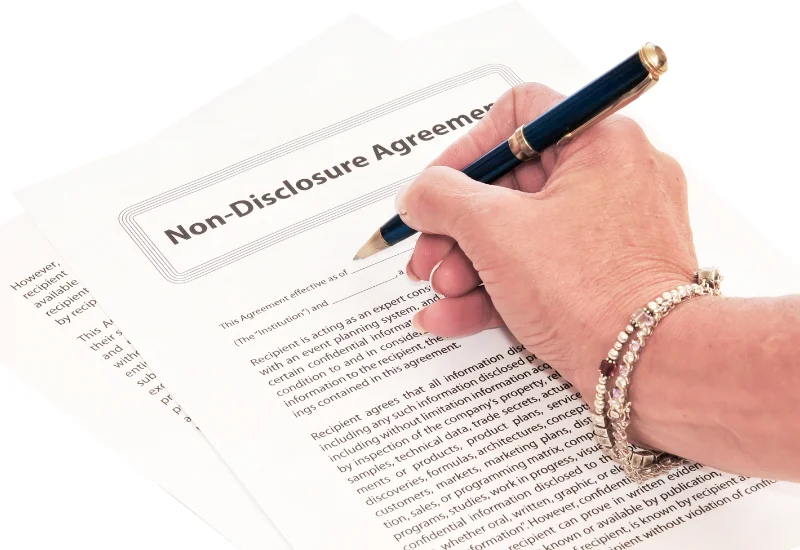
Jul 16, 2024
Written by Pieter-Jan - Written: March 16, 2023

Are you worried your company’s confidential information might fall into the wrong hands when visitors come to your office? You’re not alone: many businesses face this challenge. The good news is, there’s a simple solution to that.
Visitor NDAs help you keep your private business information protected. Whether you’re inviting potential investors, contractors, consultants, or even family members to your company, visitor NDAs are an essential tool for protecting your intellectual property.
Nowadays, it’s easier than ever to have visitors sign an NDA. The agreement can easily be integrated in a digital visitor management system, which makes reading and signing it a breeze.
In this article, we’ll explore the basics of visitor NDAs, including the following topics:
Read on to learn more about how visitor NDAs can protect your business information.
Whether you’re a seasoned entrepreneur or just starting out in the business world, chances are you’ve encountered a non-disclosure agreement, or NDA, at some point in time. This agreement is a common tool used to protect sensitive information, such as trade secrets and proprietary data, and is essential for maintaining trust and confidentiality between parties.
An NDA can be unilateral, bilateral, or multilateral, depending on the number of parties involved. A unilateral NDA is a one-way agreement where only one party is disclosing confidential information. This type of NDA is commonly used by businesses when sharing confidential information with employees, contractors or visitors.
A bilateral NDA is used when two parties are disclosing confidential information (e.g. in a partnership or a merger), whereas a multilateral NDA concerns three or more parties. The latter is commonly used in complex business arrangements, such as joint ventures or consortiums.
A visitor NDA is a type of NDA designed specifically for visitors to a business or organization. It’s typically a unilateral NDA, used to protect against the unauthorized disclosure of confidential information by individuals who are not employed by the company but require access to sensitive information for a specific purpose, such as a consultant or contractor.
These are some examples of situations where visitor NDAs can be useful:
You run a tech startup and have invited a group of investors to your research and development lab. You want to make sure nobody leaks your confidential information to your competitors.
You are hosting a focus group to test a new product or service. You want to gather feedback from potential customers, but you don’t want your competitors to catch wind of your latest innovations.
You are giving a tour of your manufacturing facility. If you are in the business of creating physical products, you may want to show off your assembly line to potential partners or investors. However, you don’t want your manufacturing processes or techniques to be copied by your competitors.
You are showing your financial records to a potential investor. If you are seeking funding for your business, you will likely have to share financial information. However, you want to make sure that sensitive data such as revenue and profits doesn’t end up in the wrong hands.
In short, whether you’re inviting potential investors, business partners, or even family members to your private office space, visitor NDAs are an essential tool for protecting your intellectual property. Any time you’re sharing sensitive information with someone who isn’t already bound by a formal contract, a visitor NDA can help ensure that your confidential information remains secure.

A simple visitor NDA should contain the following components:
Confidential information. The agreement should identify what is considered as confidential information. This may include trade secrets, customer data, financial information, or any other sensitive information you want to protect.
Exclusions. The NDA should specify any information that is not covered by the agreement. This might include information that is already publicly available or information that the visitor already knows.
Obligations. The agreement should outline the obligations of the visitor, such as maintaining the confidentiality of the information, using the information only for the stated purpose, and not disclosing the information to third parties.
Term and termination. You should also specify the duration of the NDA and how it can be terminated, such as by mutual agreement or upon completion of the stated purpose.
Consequences. The NDA should define the consequences in the event of a breach, such as injunctive relief or damages.
It’s important for NDAs to be written in clear and concise language. If the terms and conditions are too complex or difficult to understand, it may be difficult to enforce the agreement or for the parties to fully understand their obligations. A well-drafted NDA should be easy to read and understand, while still protecting the confidential information in question.
As visitor NDAs may be unfamiliar territory for most, it’s natural to feel a bit uncertain drafting one. However, with a little guidance, you can breeze through the process. By following these steps, you’ll be able to create a visitor NDA that protects your confidential information and provides peace of mind to both parties involved.
4 important steps to create a basic visitor NDA:
1 - Start with a template
2 - Include all necessary components, but keep it simple
3 - Look out for red flags
4 - Integrate the NDA in a visitor management system
Use a non-disclosure agreement template as a starting point. At the bottom of this article, you can find a free template of a simple visitor NDA, which you can customize to suit your specific needs. Or you can look for a template online.
To ensure that the agreement is legally binding and enforceable, you should include the essential components in your visitor NDA: confidential information, exclusions, obligations, term and consequences.
Avoid using complex legal jargon that might intimidate or confuse your visitors. Simplify the language and structure to make the agreement easy to understand.
While visitor NDAs can be an effective way to protect confidential information, there are some red flags to watch out for when writing and reviewing an NDA. Some common problematic clauses you should look out for, are these:
An overly broad definition of “confidential information”. A visitor NDA should clearly define what information is considered confidential and what is not. If the definition is too broad, it can be difficult for the visitor to know what information they are allowed to discuss or disclose.
Unreasonable timeframes. A visitor NDA should specify a reasonable timeframe for which the visitor must keep the confidential information secret. If the timeframe is too long or unreasonable, it may not be enforceable.
Excessive obligations. A visitor NDA should not place excessive obligations on the visitor that go beyond what is necessary to protect the confidential information. If the obligations are unreasonable, it may not be enforceable.
Lack of clarity on exclusions. The NDA should clearly identify information that is excluded from the agreement, such as information that is already publicly available. If the exclusions are not clearly defined, it can be difficult for the visitor to know what information they can and cannot disclose.
Vague consequences. The NDA should clearly specify what remedies are available if the visitor breaches the agreement. If the remedies are not clearly defined, it may be difficult to enforce the agreement.
Now that you’ve crafted an effective visitor NDA, you are ready to welcome visitors and have them sign the agreement before entering your premises. The easiest way to do so, is by integrating the NDA in a digital visitor management system.
Digital visitor registration software can make it easier to present visitor NDA’s to your visitors and obtain their digital signatures. With a software solution such as Vizito, visitors can quickly and easily sign NDAs using a touch screen tablet or their own device. This not only streamlines the visitor registration process but also ensures that all NDAs are securely stored and easily accessible. In addition, a digital visitor management system allows you to customize the NDA based on visitor type.
Read more
A digital visitor management system has plenty of advantages. Here are 7 reasons to replace your paper visitor log in 2023
Improve safety and security in your company? Learn how visitor management systems can help

Below you can download a free visitor NDA template that you can use as a starting point to your own visitor NDA, or you can use any pre-existing template available online.
When using a pre-existing template, keep in mind you still need to tailor it to your specific needs and situation. Make sure to review the agreement carefully and modify it as necessary to ensure it meets your requirements.
To ensure that the agreement is enforceable in your jurisdiction and adequately protects your confidential information, you may also want to consider seeking legal advice or having an attorney review the agreement.
In today’s fast-paced business environment, protecting confidential information is more important than ever. Visitor NDAs provide a crucial tool for businesses to safeguard their sensitive data when welcoming external parties to their premises.
By following the best practices described in this article and exploring digital solutions such as visitor registration software, you are all set to better protect your confidential information and foster secure relationships with your visitors.
To get a feel of how a modern visitor management system can help your business, try out Vizito during a 14-day trial. Chat with us or book a demo to discuss how Vizito can help you improve your reception.
Got more questions? These are the 7 most common questions about digital visitor management – and our answers.